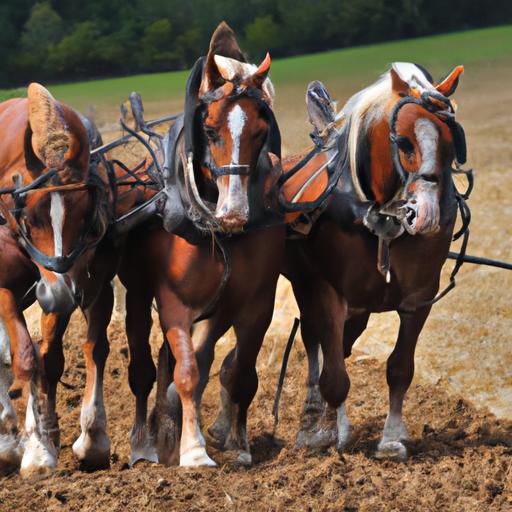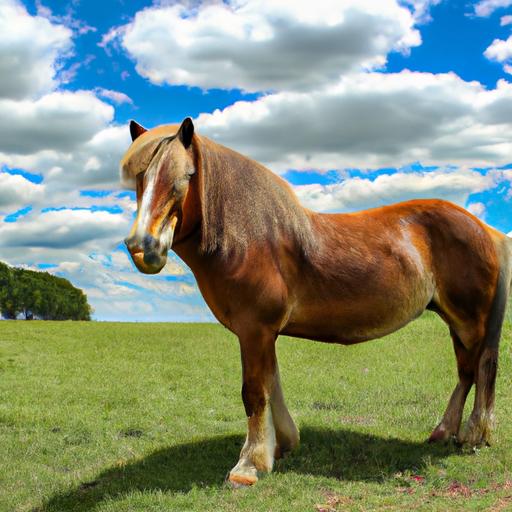Discover the proper care and training tips for farm horse breeds, including nutrition, grooming, and exercise requirements. Unleash their full potential in agriculture!
When we think of farming, we often envision vast fields, hardworking farmers, and the gentle yet powerful presence of horses. These magnificent creatures have been an integral part of agriculture for centuries, playing a crucial role in various farming practices. In this article, I’ll introduce you to the world of farm horse breeds, highlighting their importance in modern-day farming.
The Vitality of Farm Horse Breeds in Agriculture

Agriculture heavily relies on the strength, endurance, and versatility of horses. Farm horse breeds have been selectively bred over generations to excel in various farming tasks, making them indispensable partners for farmers around the world. These majestic animals possess the power to till fields, pull heavy loads, and transport goods efficiently, revolutionizing the way we cultivate crops and manage farms.
Unveiling the Role of Horses in Farming Practices
When you think about traditional farming, what images come to mind? Perhaps it’s a horse-drawn plow, effortlessly cutting through the earth, or a team of horses pulling a wagon laden with freshly harvested produce. Horses have been instrumental in plowing fields, preparing the soil for planting, and even spreading manure to enrich the land. Their remarkable strength and agility significantly reduce the physical strain on farmers, allowing them to accomplish tasks more efficiently.
But the contributions of farm horse breeds don’t end there. These equine partners also provide reliable transportation, helping farmers move equipment, supplies, and harvested crops across large distances. Their steady gait and surefootedness make them ideal for navigating uneven terrains and muddy paths, ensuring that goods reach their destination safely and swiftly.
In conclusion, farm horse breeds are an invaluable asset to agricultural practices. Their strength, endurance, and versatility enable farmers to accomplish tasks with ease, revolutionizing the way we cultivate our lands. So, join us at Horsemasterypro.com as we delve deeper into the world of farm horse breeds and explore the fascinating role they play in shaping the future of farming.
Stay tuned for the next section, where we’ll explore some of the most popular farm horse breeds and their unique characteristics.
Popular Farm Horse Breeds
When it comes to farm horse breeds, several names stand out for their exceptional qualities and suitability for agricultural work. Let’s explore some of the most commonly used breeds and delve into their unique characteristics that make them the top choices for farmers worldwide.
1. Percheron
The Percheron breed, originating from France, is renowned for its immense strength and gentle temperament. These majestic horses possess a solid build, making them ideal for heavy-duty tasks such as pulling heavy loads and plowing fields. With their unwavering endurance and willingness to work, Percherons have become a popular choice for farmers seeking reliability and power.
2. Belgian Draft
Belgian Draft horses, hailing from Belgium, are known for their impressive size and strength. Their muscular stature allows them to handle demanding farm work effortlessly. Despite their robust appearance, Belgians are known for their calm and docile nature, making them easy to handle and work with. They excel in pulling heavy loads, making them an asset when it comes to hauling timber, equipment, or harvested crops.
3. Clydesdale
The Clydesdale breed, originating from Scotland, is instantly recognizable for its striking appearance. With their feathered feet and abundant leg hair, these horses possess an undeniable charm. Clydesdales are not only eye-catching but also possess remarkable strength and endurance, making them well-suited for farm work. Their calm and gentle demeanor further enhances their appeal, making them a popular choice for farmers seeking reliability and versatility.
4. American Quarter Horse
While the American Quarter Horse is renowned for its speed and agility on the racetrack, it also makes an excellent farm horse breed. With a compact and muscular build, these horses possess the strength and athleticism required for various agricultural tasks. Their versatility allows them to excel in both working and riding roles. American Quarter Horses are often chosen for their intelligence, adaptability, and willingness to please, making them an ideal choice for farmers seeking a versatile equine partner.
In conclusion, these popular farm horse breeds have earned their reputation for their exceptional qualities and suitability for agricultural work. Whether it’s the Percheron, Belgian Draft, Clydesdale, or American Quarter Horse, each breed brings its own unique set of characteristics to the table. Join us at Horsemasterypro.com as we explore these farm horse breeds in more detail and discover how they contribute to the success of modern-day farming.
Stay tuned for the next section, where we’ll delve into the benefits of farm horse breeds in agriculture and how they enhance farming practices.
Benefits of Farm Horse Breeds in Agriculture
When it comes to farming, the utilization of farm horse breeds offers a multitude of advantages that cannot be overlooked. Let’s delve into the various benefits these magnificent creatures bring to agricultural practices.
1. Increased Efficiency and Productivity
Farm horse breeds have been selectively bred to possess remarkable strength and endurance, allowing them to perform laborious tasks with relative ease. Their natural power enables them to plow fields efficiently, saving valuable time and effort for farmers. By harnessing the strength of these equine companions, farmers can cover larger areas in a shorter span, leading to increased productivity and higher yields.
2. Environmentally Friendly
In an era where sustainability is paramount, farm horse breeds provide a greener alternative to heavy machinery. Unlike tractors and other mechanical equipment, horses don’t rely on fossil fuels or emit harmful gases. Their carbon footprint is significantly lower, making them an eco-friendly choice for farmers who prioritize environmental stewardship. By incorporating horses into farming practices, we can reduce our impact on the environment and promote a more sustainable future.
3. Versatility in Farming Tasks
Farm horse breeds are incredibly versatile and adapt to various farming tasks effortlessly. From plowing and harrowing to pulling heavy loads, these equine partners excel in a wide range of agricultural activities. Whether it’s transporting goods, maneuvering through challenging terrains, or assisting with livestock management, their adaptability makes them invaluable assets on the farm.
4. Strong Bond and Trust
The relationship between farmers and their farm horse breeds is built on trust and mutual understanding. Working closely with these intelligent animals fosters a strong bond, enhancing communication and cooperation. This connection not only improves the efficiency of farm work but also creates a fulfilling and rewarding experience for both farmers and horses.
In conclusion, farm horse breeds offer numerous benefits to agricultural practices. Their efficiency, sustainability, versatility, and ability to forge strong bonds make them indispensable partners on the farm. By harnessing their power and skills, farmers can elevate their productivity while embracing a more environmentally conscious approach to farming.
Stay tuned for the next section, where we’ll explore the factors to consider when choosing the most suitable farm horse breed for your specific needs.
Factors to Consider When Choosing Farm Horse Breeds
When it comes to selecting the right farm horse breed for your agricultural needs, several factors should be taken into consideration. Each breed possesses unique characteristics that make them better suited for specific tasks. Let’s delve into the key factors you should consider when making this important decision.
1. Size Matters: Matching the Horse to the Task
One of the primary factors to consider is the size of the horse. Different farming tasks may require horses of varying sizes. For heavy-duty tasks such as plowing or pulling heavy loads, larger and stronger breeds like the Belgian and Percheron excel. Conversely, for lighter tasks or smaller-scale farms, smaller breeds like the Haflinger or Welsh Cob may be more appropriate. Assess the nature of your farming operations to determine the optimal size for your farm horse breed.
2. Temperament: A Calm and Willing Companion
The temperament of a farm horse breed is another crucial aspect to consider. A calm and willing disposition is essential for smooth and efficient farm work. Look for breeds known for their docility and adaptability. For example, the Clydesdale and Shire breeds are often praised for their gentle nature, making them ideal partners for beginners or those seeking a more relaxed work environment.
3. Adaptability to Different Farming Tasks
Different farm horse breeds have varying aptitudes for specific tasks. Some breeds are better suited for plowing fields, while others excel in pulling carts or working with livestock. Consider the specific needs of your farm and choose a breed that demonstrates adaptability to the tasks at hand. Thorough research and consultation with experienced breeders can help you identify breeds that have a proven track record in the areas you require.
In conclusion, selecting the right farm horse breed involves careful consideration of factors such as size, temperament, and adaptability. Matching the horse to the specific tasks required on your farm is essential for optimal performance and efficiency. By taking these factors into account, you can ensure a harmonious partnership between you, your farm, and your equine companion.
Stay tuned for the next section, where we’ll explore the care and training required to keep farm horse breeds happy and healthy.
Conclusion
As we conclude our exploration into the world of farm horse breeds, it becomes evident that these majestic creatures are more than just powerful companions in agriculture – they are the backbone of efficient and sustainable farming practices. The importance of farm horse breeds in agriculture cannot be overstated, as they provide the strength, endurance, and versatility needed to carry out various farming tasks.
From plowing fields to transporting heavy loads and everything in between, farm horse breeds have proven themselves to be reliable partners for farmers across the globe. Their contribution to the agricultural industry has shaped the way we cultivate land, improving efficiency and reducing the physical strain on farmers.
At Horsemasterypro.com, we encourage farmers and horse enthusiasts alike to consider the benefits of utilizing suitable farm horse breeds in their operations. By selecting the right breed for your specific needs, you can enhance productivity, reduce reliance on machinery, and cultivate a deeper connection with these remarkable animals.
Proper care and training are essential to ensure the well-being and performance of farm horse breeds. Providing them with a balanced nutrition plan, regular grooming sessions, and ample exercise will help maintain their health and vitality. Remember, a well-cared-for and well-trained horse is a happy and productive partner on your farm.
In conclusion, farm horse breeds play a vital role in agriculture, and their value cannot be underestimated. Join us at Horsemasterypro.com as we continue to explore the world of horses and share invaluable insights into their care, training, and the remarkable bond they form with humans.
Thank you for joining us on this journey. Stay tuned for more informative articles and resources on farm horse breeds and the fascinating world of equine partnerships.


